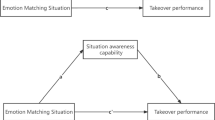Abstract
Despite advancements in driver-assisted systems, human emotions significantly influence driving safety and behavior. Previous research has highlighted the impact of emotions like anger and anxiety on driving, suggesting the need for effective emotional regulation strategies. Our approach leverages the visually engaging 3D assistant avatars and the calming effect of empathetic voice cues to enhance the driver’s emotional state, particularly in stressful scenarios such as traffic jams, encounters with uncivil driving behavior, and sudden pedestrian crossings. A video-based user study was conducted with 16 participants to evaluate the effectiveness of this combined approach. The study compared the proposed method against the baseline of empathetic voice alone across three specific driving situations. Using the Augmented Video testing platform, participants experienced simulated driving scenarios, followed by interventions from either the proposed or baseline method. Results from a two-item, 5-point Likert scale questionnaire indicate a preference for the combined method, highlighting its potential to improve driving safety and promote a more civilized driving experience. This research contributes to developing in-vehicle emotional regulation systems, offering significant insights into managing driver emotions to enhance overall road safety.
Access this chapter
Tax calculation will be finalised at checkout
Purchases are for personal use only
Similar content being viewed by others
References
Animaze: Animaze official website. https://www.animaze.us/
Anyasodo, B., Burnett, G.: Empathy consideration in the design of natural language interfaces for future vehicles (2021)
Bosch, E., et al.: Emotional garage: a workshop on in-car emotion recognition and regulation. In: Adjunct Proceedings of the 10th International Conference on Automotive user Interfaces and Interactive Vehicular Applications, pp. 44–49 (2018)
Braun, M., Li, J., Weber, F., Pfleging, B., Butz, A., Alt, F.: What if your car would care? Exploring use cases for affective automotive user interfaces. In: 22nd International Conference on Human-Computer Interaction with Mobile Devices and Services, pp. 1–12 (2020)
Braun, M., Schubert, J., Pfleging, B., Alt, F.: Improving driver emotions with affective strategies. Multimodal Technol. Interact. 3(1), 21 (2019)
Ceccacci, S., et al.: A preliminary investigation towards the application of facial expression analysis to enable an emotion-aware car interface. In: Antona, M., Stephanidis, C. (eds.) HCII 2020. LNCS, vol. 12189, pp. 504–517. Springer, Cham (2020). https://doi.org/10.1007/978-3-030-49108-6_36
Dymond, R.F.: A scale for the measurement of empathic ability. J. Consult. Psychol. 13(2), 127 (1949)
HuggingFace: multi-voice-TTS-GPT-soVITS. https://huggingface.co/spaces/Ailyth/Multi-voice-TTS-GPT-SoVITS
Knutzen, K., Weidner, F., Broll, W.: Talk to me! Exploring stereoscopic 3D anthropomorphic virtual assistants in automated vehicles. In: Proceedings of the 11th International Conference on Automotive User Interfaces and Interactive Vehicular Applications: Adjunct Proceedings, pp. 363–368 (2019)
Leite, I., Pereira, A., Mascarenhas, S., Martinho, C., Prada, R., Paiva, A.: The influence of empathy in human-robot relations. Int. J. Hum Comput Stud. 71(3), 250–260 (2013)
Liu, S., et al.: The empathetic car: exploring emotion inference via driver behaviour and traffic context. Proc. ACM Interact. Mob. Wearable Ubiquitous Technol. 5(3), 1–34 (2021)
Mori, M., MacDorman, K.F., Kageki, N.: The uncanny valley [from the field]. IEEE Robot. Autom. Mag. 19(2), 98–100 (2012)
Nesbit, S.M., Conger, J.C., Conger, A.J.: A quantitative review of the relationship between anger and aggressive driving. Aggress. Violent. Beh. 12(2), 156–176 (2007)
Okamoto, S., Sano, S.: Anthropomorphic AI agent mediated multimodal interactions in vehicles. In: Proceedings of the 9th International Conference on Automotive User Interfaces and Interactive Vehicular Applications Adjunct, pp. 110–114 (2017)
Paredes, P.E., et al.: Just breathe: in-car interventions for guided slow breathing. Proc. ACM Interact. Mob. Wearable Ubiquitous Technol. 2(1), 1–23 (2018)
Roidl, E., Siebert, F.W., Oehl, M., Höger, R.: Introducing a multivariate model for predicting driving performance: the role of driving anger and personal characteristics. J. Safety Res. 47, 47–56 (2013)
Soro, A., Rakotonirainy, A., Schroeter, R., Wollstädter, S.: Using augmented video to test in-car user experiences of context analog HUDs. In: Adjunct Proceedings of the 6th International Conference on Automotive User Interfaces and Interactive Vehicular Applications, pp. 1–6 (2014)
Stephens, A.N., Groeger, J.A.: Situational specificity of trait influences on drivers’ evaluations and driving behaviour. Transport. Res. F: Traffic Psychol. Behav. 12(1), 29–39 (2009)
Urakami, J., Moore, B.A., Sutthithatip, S., Park, S.: Users’ perception of empathic expressions by an advanced intelligent system. In: Proceedings of the 7th International Conference on Human-Agent Interaction, pp. 11–18 (2019)
Urakami, J., Sutthithatip, S., Moore, B.A.: The effect of naturalness of voice and empathic responses on enjoyment, attitudes and motivation for interacting with a voice user interface. In: Kurosu, M. (ed.) HCII 2020. LNCS, vol. 12182, pp. 244–259. Springer, Cham (2020). https://doi.org/10.1007/978-3-030-49062-1_17
Wang, F., Chang, C.M., Igarashi, T.: Virtual horse: an anthropomorphic notification interface for traffic accident reduction. In: 13th International Conference on Automotive User Interfaces and Interactive Vehicular Applications, pp. 16–20 (2021)
Wang, F., Chang, CM., Igarashi, T.: Direct or indirect: a video experiment for in-vehicle alert systems. In: Krömker, H. (eds.) HCI in Mobility, Transport, and Automotive Systems, HCII 2023. LNCS, vol. 14049, pp. 245–259. Springer, Cham (2023). https://doi.org/10.1007/978-3-031-35908-8_17
Waytz, A., Heafner, J., Epley, N.: The mind in the machine: anthropomorphism increases trust in an autonomous vehicle. J. Exp. Soc. Psychol. 52, 113–117 (2014)
Zepf, S., Dittrich, M., Hernandez, J., Schmitt, A.: Towards empathetic car interfaces: emotional triggers while driving. In: Extended Abstracts of the 2019 CHI Conference on Human Factors in Computing Systems, pp. 1–6 (2019)
Zhou, X., He, G., Zhu, H., Wang, Y., Zhang, W.: Evaluation of driver stress intervention with guided breathing and positive comments. Appl. Ergon. 114, 104144 (2024)
Author information
Authors and Affiliations
Corresponding author
Editor information
Editors and Affiliations
Rights and permissions
Copyright information
© 2025 The Author(s), under exclusive license to Springer Nature Switzerland AG
About this paper
Cite this paper
Huang, B., Gui, X., Chang, CM., Xie, H. (2025). Better Together: 3D Anthropomorphic Assistant Avatars and Empathetic Voice Interventions on Emotion Regulation. In: Harris, D., Li, WC., Krömker, H. (eds) HCI International 2024 – Late Breaking Papers. HCII 2024. Lecture Notes in Computer Science, vol 15381. Springer, Cham. https://doi.org/10.1007/978-3-031-76824-8_6
Download citation
DOI: https://doi.org/10.1007/978-3-031-76824-8_6
Published:
Publisher Name: Springer, Cham
Print ISBN: 978-3-031-76823-1
Online ISBN: 978-3-031-76824-8
eBook Packages: Computer ScienceComputer Science (R0)




